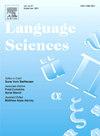Paradoxical practices of being with others: Some experiential dynamics at play while interacting across differences
IF 1.1
2区 文学
Q2 EDUCATION & EDUCATIONAL RESEARCH
引用次数: 0
Abstract
This paper presents findings from an experiment/workshop, which was motivated by the ever-increasing need in today’s fractured and complex world to foster engagements between people of diverse backgrounds, positions, and identities. The workshop taught and employed the PRISMA method, which provides a way for researcher-participants to study the experiential dynamics of participatory sense-making in social interactions. PRISMA can be seen as an analogue process technology or a participation technology. It is used to refract the experience of interaction dynamics as we engage in interactions. In this study, we invited participants to interact by drawing together on shared sheets of paper. We found that participants engaged in what we call paradoxical practices of being with each other, and that the materials through which people interacted influenced the emotions and sense-making that emerged. We present the research findings in a way that can be followed step by step by a reader in a traditional fashion, but also give the reader structured options to engage with the findings presented in a participatory way, true to the message of the paper. Finally, we draw conclusions from this work for the use of technology in human co-becoming, enactive ethics of participation and difference, and how to enhance interaction “literacy”. This research deepens the understanding of participatory sense-making, and sheds light on the interactive tensions at the roots of languaging and co-becoming. The findings contribute to both scientific knowledge and practical implications for navigating complex social interactions.
与他人相处的矛盾实践:跨差异互动时的一些经验动态
本文介绍了一项实验/研讨会的研究结果,该实验/研讨会的动机是,在当今支离破碎和复杂的世界中,促进不同背景、职位和身份的人之间的接触的需求日益增长。工作坊采用了PRISMA方法,为研究者和参与者提供了一种研究社会互动中参与性意义形成的经验动态的方法。PRISMA可以看作是一种模拟过程技术或参与技术。当我们参与互动时,它被用来折射互动动态的体验。在这项研究中,我们邀请参与者在共享的纸上一起画画。我们发现,参与者参与了一种我们称之为彼此相处的矛盾实践,人们互动的材料影响了出现的情绪和意义构建。我们以一种读者可以以传统方式逐步遵循的方式呈现研究结果,但也为读者提供结构化的选择,以参与式的方式参与呈现的研究结果,忠实于论文的信息。最后,我们从这项工作中得出结论,在人类共同成为中使用技术,参与和差异的积极伦理,以及如何提高互动“素养”。本研究加深了对参与式意义建构的理解,并揭示了语言和共同成为根源的互动紧张关系。这一发现对引导复杂的社会互动既提供了科学知识,又具有实际意义。
本文章由计算机程序翻译,如有差异,请以英文原文为准。
求助全文
约1分钟内获得全文
求助全文
来源期刊

Language Sciences
Multiple-
CiteScore
2.90
自引率
0.00%
发文量
38
期刊介绍:
Language Sciences is a forum for debate, conducted so as to be of interest to the widest possible audience, on conceptual and theoretical issues in the various branches of general linguistics. The journal is also concerned with bringing to linguists attention current thinking about language within disciplines other than linguistics itself; relevant contributions from anthropologists, philosophers, psychologists and sociologists, among others, will be warmly received. In addition, the Editor is particularly keen to encourage the submission of essays on topics in the history and philosophy of language studies, and review articles discussing the import of significant recent works on language and linguistics.
 求助内容:
求助内容: 应助结果提醒方式:
应助结果提醒方式:


